AI and SEO: What’s Changing and How to Stay Ahead in 2025
AI isn't just changing how SEO is done - it’s transforming the way search engines “think” and process information. Importantly, it’s also changing how and where audiences search.
With AI-powered search experiences taking the spotlight, traditional SEO processes are becoming outdated. It’s 2025; simply ranking for keywords won’t cut it anymore. Organic search marketing is now about owning search intent and experience.
Let’s dive into what you need to know as a marketer to navigate this fast-changing space.
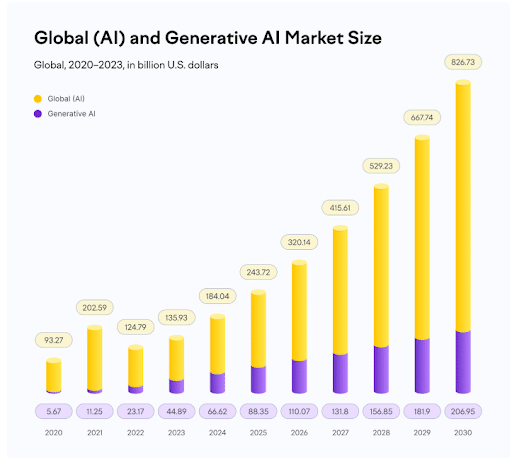
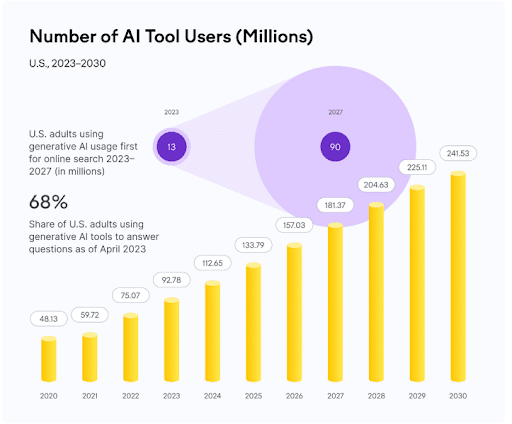
Source: Online Search After ChatGPT Report (Semrush + Statista)
Google’s AI-Powered search updates
Here are three Google updates you should be aware of:
Search Generative Experience (SGE)
AI-generated answers now appear at the top of search results, pushing traditional rankings lower.
Example:
Someone searches for “benefits of chia seeds”. Instead of seeing a list of links to various health and wellness websites, they might encounter a concise AI-generated summary at the top of the results, highlighting how chia seeds aid digestion, contribute to heart health and offer a source of protein. This single, authoritative answer could reduce the likelihood of users clicking through to traditional organic listings below.
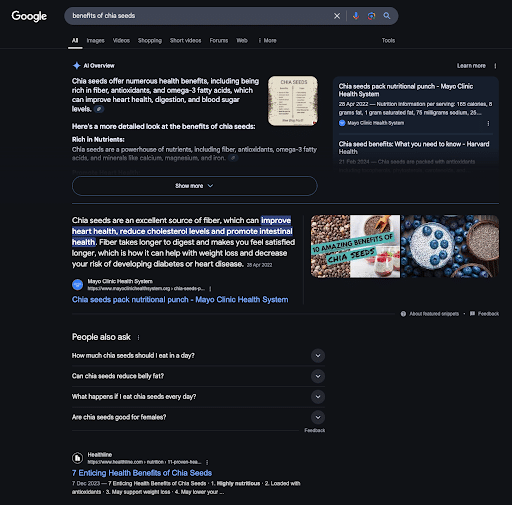
Multimodal Search (MUM)
Google processes text, images and video together, making optimised multimedia content essential.
Example:
A user types “Can I wear these shoes to hike Mount Fuji?” and attaches a photo of their hiking boots. Google’s AI analyses the image and looks at factors such as the tread, material and condition of the boots, along with text-based data about typical trail conditions on Mount Fuji. It then provides a tailored answer, possibly including additional suggestions like traction aids, recommended footwear brands, or relevant weather considerations.
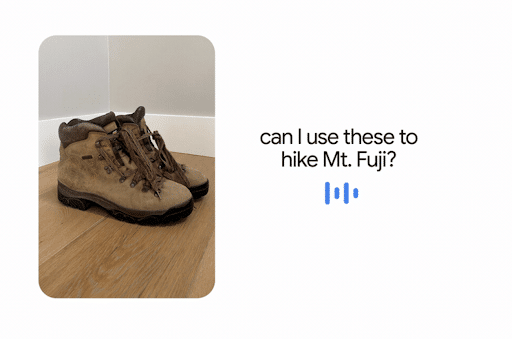
Real-time algorithm adaptations
AI-driven updates mean rankings can change quickly. Staying on top requires continuous monitoring and adjustments.
Example:
If there’s a sudden spike in searches for “pet-friendly holiday rentals in the Gold Coast”, Google might quickly promote pages that have updated, relevant availability and user-friendly booking processes. Sites that fail to refresh content or address this demand might drop in the rankings almost instantly.
The ‘One-Size-Fits-All’ approach to SERP is over
Unique Search Engine Results Pages (SERPs) are nothing new. However, AI-powered search is hyper-personalised - no two searchers see the same results. That means ranking #1 in an organic search report isn’t a guarantee of overall visibility.
So, how do you ensure your brand stands out?
The first step is understanding your audience deeply so you can understand what’s valuable to them. First-party data is invaluable - it gives you a direct line to your audience and real insights based on their actual interactions with your brand. Unlike third-party data, which is becoming harder to access due to privacy changes, first-party data is yours to own and leverage.
Build brand authority through quality content and PR. AI-driven search prefers brands with strong recognition, brand mentions and expertise beyond keyword rankings.
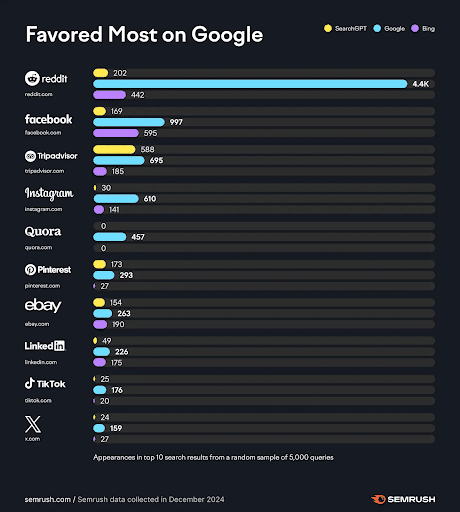
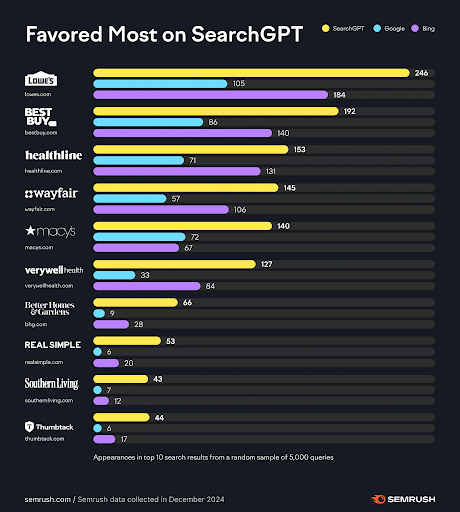
The payoff? A more connected approach to digital marketing, where SEO, content and brand-building work together.
Google still prioritises E-E-A-T
When it comes to rankings, Google still values Experience, Expertise, Authoritativeness and Trustworthiness (E-E-A-T).
This is a challenge for pure AI-generated content as it often lacks depth in these areas. AI-generated content struggles to reflect an individual's real-life experience or deep expertise, which is likely why Google scores it poorly on E-E-A-T.
Here’s what you can do today to have a better chance at ranking higher on search results:
- Show real authors with credibility: Google values content backed by genuine experts. Attribute every piece of content (article, guide, blog post) to a real person and link to their LinkedIn profile. For example, if your article is about property price forecasts, have it authored by a registered property manager and link to their LinkedIn profile or official website (if they have one). This signals credibility and builds trust with both users and search engines.
- Go beyond basic content - share unique insights: AI-generated content tends to reproduce widely available, generic information. To stand out, you need to offer perspectives that only real industry experts can provide. Use specific experiences, case studies or data-backed insights. Address these questions: What worked for your business? What lessons did you learn? For instance, instead of writing a generic guide on ‘The Best South Australian Wines’ that lists commonly found information about 10 or 12 known wines, a wine company might want to share the story and experience of how a wine aficionado decided which wines are the best ones from South Australia.
- Invest in original research and expert contributions: Invest in data, expert insights and in-depth analysis to create content that adds genuine value with evidence. You can conduct surveys, gather first-party data and collaborate with industry experts to create research-backed content.
AI can assist with SEO, but it can’t deliver results alone
AI is making SEO tasks quicker and easier - keyword research, technical audits and content creation are all improving. Plus, when evaluated on a quality-speed matrix over time, AI-generated content has taken on a sharp upward trajectory.
People are turning to ChatGPT for searches by asking questions, seeking methods, recipes and more. This means SEO has to evolve too. AI models still depend on SERP data, so at Rocket, we ensure our content meets E-E-A-T standards, our sites load quickly and we invest in building a strong brand reputation for our clients.
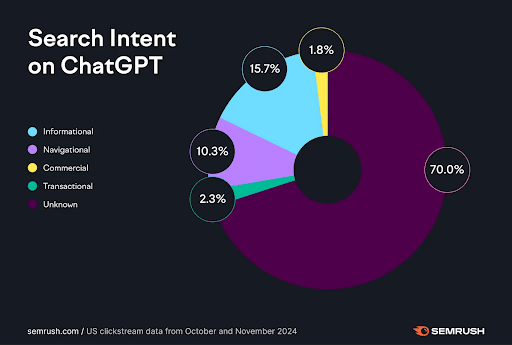
Using AI to speed up SEO is smart; it’s something that we embrace at Rocket. However, using AI alone won’t yield real results. A strategic, human-led approach is what sets great SEO apart from a flood of mediocre, AI-generated content.
How to future-proof your SEO
A strong SEO strategy isn’t just about following algorithms; it’s about staying relevant for your target audience. Here’s an example of an agile SEO framework built for success in the current environment. If you’d like a better understanding of what’s likely to work for your specific requirements, get in touch.
The next 3 weeks: Quick wins for immediate impact
Analyse data in real-time to keep up with AI changes
- Set up alerts in Google Search Console and GA4 to track any sudden ranking fluctuations that come up.
- Review your top 10 performing pages with GA4 - identify trends in keywords, engagement, and traffic shifts. You can use tools like Semrush and Ahrefs for this.
- Compare before-and-after performance for any content changes made in the past quarter.
Run quick experiments to discover what works
- A/B test different title tags and meta descriptions for high-value pages to improve CTR.
- Experiment with internal linking, like adjusting the anchor text and structure to enhance page authority.
Keep your website content updated for freshness and value
- Audit at least 5 - 10 high-traffic blog posts or landing pages - update outdated info and refresh examples.
- Identify and fix broken links to improve user experience and SEO rankings.
- Review competitor content to spot gaps where you can provide better insights.
The next 3 months: Sustainable growth and long-term SEO wins
Build a scalable system for real-time SEO monitoring
- Automate reporting dashboards in GA4, Google Search Console and third-party SEO tools.
- Establish a routine to review SEO performance every 2 weeks, focusing on AI-driven ranking changes.
- Monitor user behaviour on key pages using heatmaps and session recordings.
Test and implement data-driven SEO changes at scale
- Roll out structured data markup across key pages to enhance rich results.
- Expand A/B testing to content formats (e.g., short-form vs. long-form, text vs. video) to find out what works best.
- Experiment with AI-generated FAQs based on real search queries and measure engagement.
Maintain a continuous content refresh strategy
- Develop a rolling content update schedule - refresh at least 2 blog posts per month.
- Incorporate industry trends, expert quotes and proprietary data into existing content.
- Conduct keyword research every quarter to adapt to shifting search intent.
The future of SEO is about delivering true value in every interaction. And that is always measured in terms of value to your audience. The right mix of AI efficiency and strategic human insight will make brands stand out in what is sure to be a growing and increasingly complex space.
Need a stronger SEO strategy for your business? Contact our award-winning SEO experts here or call 1300 059 620.
About the Author

Joe is an award-winning SEO leader with a proven track record of scaling high-performing teams and delivering measurable results. Joe has driven organic growth for global brands like Amazon, Coca-Cola, ANZ, and Dulux through innovative strategies and data-driven insights. With over 20 industry award nominations - including Best SEO Agency APAC 2024 and Best SEO Campaign - Joe is recognised as a leader in the field. Passionate about building impactful teams and exploring the transformative role of AI in SEO, Joe brings a forward-thinking approach to digital marketing at Rocket Agency.









































